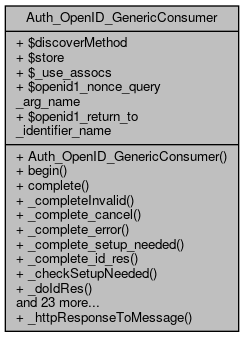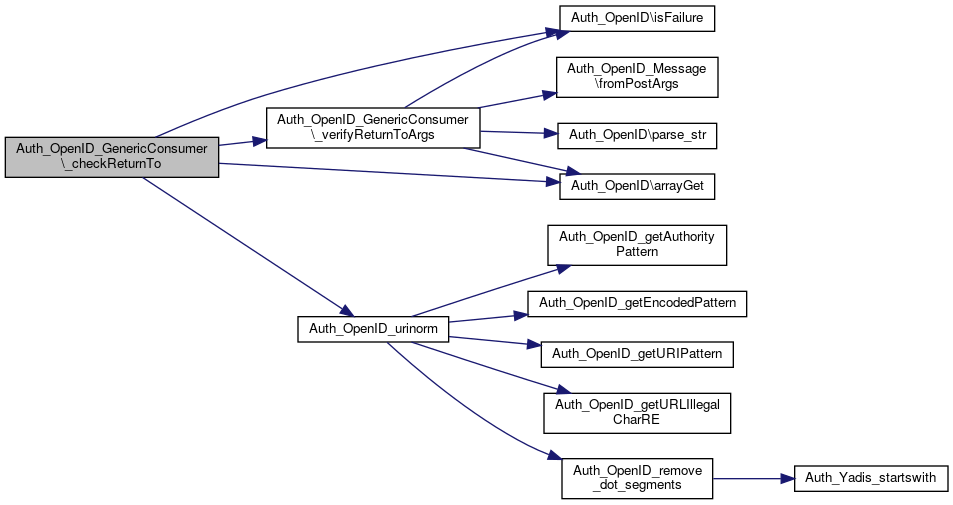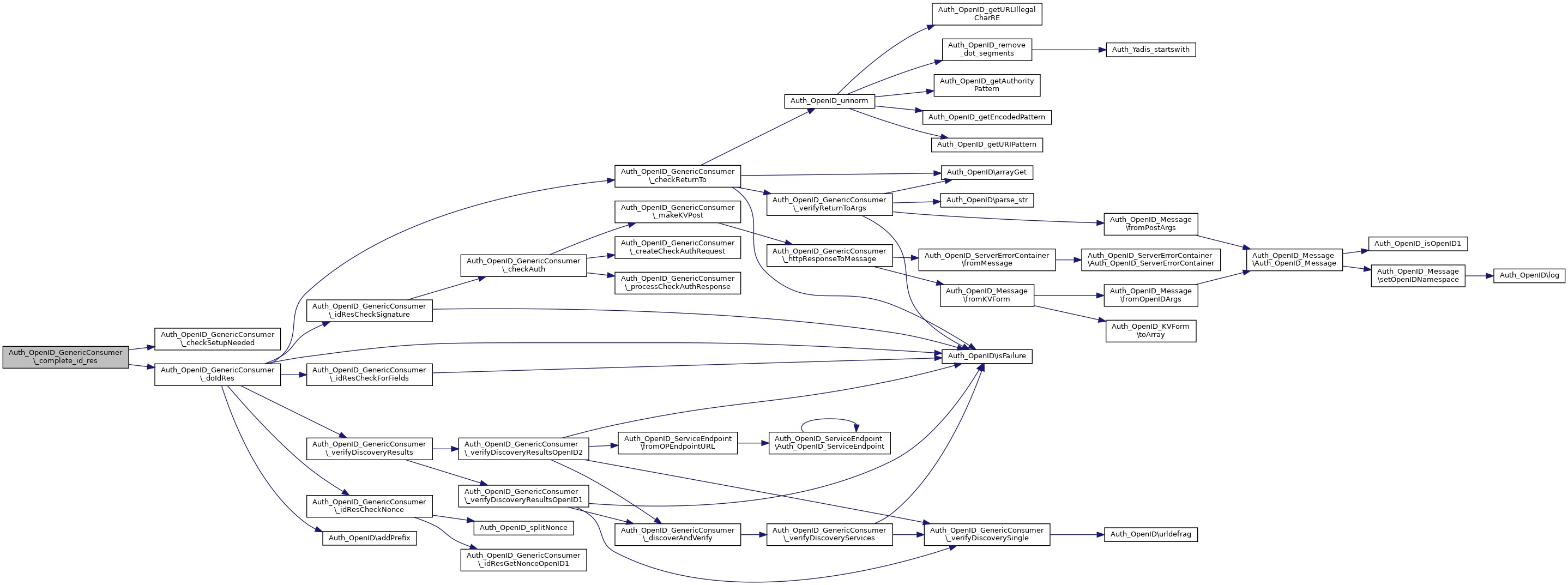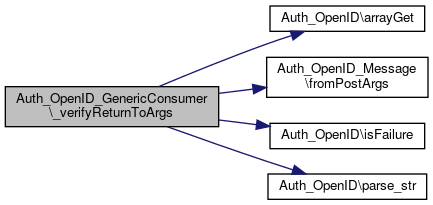 Collaboration diagram for Auth_OpenID_GenericConsumer:
Collaboration diagram for Auth_OpenID_GenericConsumer:Public Member Functions | |
| Auth_OpenID_GenericConsumer ($store) | |
This method initializes a new Auth_OpenID_Consumer instance to access the library. More... | |
| begin ($service_endpoint) | |
Called to begin OpenID authentication using the specified Auth_OpenID_ServiceEndpoint. More... | |
| complete ($message, $endpoint, $return_to) | |
Given an Auth_OpenID_Message, Auth_OpenID_ServiceEndpoint and optional return_to URL, complete OpenID authentication. More... | |
| _completeInvalid ($message, $endpoint, $unused) | |
| @access private More... | |
| _complete_cancel ($message, $endpoint, $unused) | |
| @access private More... | |
| _complete_error ($message, $endpoint, $unused) | |
| @access private More... | |
| _complete_setup_needed ($message, $endpoint, $unused) | |
| @access private More... | |
| _complete_id_res ($message, $endpoint, $return_to) | |
| @access private More... | |
| _checkSetupNeeded ($message) | |
| @access private More... | |
| _doIdRes ($message, $endpoint, $return_to) | |
| @access private More... | |
| _checkReturnTo ($message, $return_to) | |
| @access private More... | |
| _verifyReturnToArgs ($query) | |
| @access private More... | |
| _idResCheckSignature ($message, $server_url) | |
| @access private More... | |
| _verifyDiscoveryResults ($message, $endpoint=null) | |
| @access private More... | |
| _verifyDiscoveryResultsOpenID1 ($message, $endpoint) | |
| @access private More... | |
| _verifyDiscoverySingle ($endpoint, $to_match) | |
| @access private More... | |
| _verifyDiscoveryResultsOpenID2 ($message, $endpoint) | |
| @access private More... | |
| _discoverAndVerify ($claimed_id, $to_match_endpoints) | |
| @access private More... | |
| _verifyDiscoveryServices ($claimed_id, $services, $to_match_endpoints) | |
| @access private More... | |
| _idResGetNonceOpenID1 ($message, $endpoint) | |
| Extract the nonce from an OpenID 1 response. More... | |
| _idResCheckNonce ($message, $endpoint) | |
| @access private More... | |
| _idResCheckForFields ($message) | |
| @access private More... | |
| _checkAuth ($message, $server_url) | |
| @access private More... | |
| _createCheckAuthRequest ($message) | |
| @access private More... | |
| _processCheckAuthResponse ($response, $server_url) | |
| @access private More... | |
| _makeKVPost ($message, $server_url) | |
| @access private More... | |
| _getAssociation ($endpoint) | |
| @access private More... | |
| _extractSupportedAssociationType ($server_error, $endpoint, $assoc_type) | |
| Handle ServerErrors resulting from association requests. More... | |
| _negotiateAssociation ($endpoint) | |
| @access private More... | |
| _requestAssociation ($endpoint, $assoc_type, $session_type) | |
| @access private More... | |
| _extractAssociation ($assoc_response, $assoc_session) | |
| @access private More... | |
| _createAssociateRequest ($endpoint, $assoc_type, $session_type) | |
| @access private More... | |
| _getOpenID1SessionType ($assoc_response) | |
| Given an association response message, extract the OpenID 1.X session type. More... | |
Static Public Member Functions | |
| static | _httpResponseToMessage ($response, $server_url) |
| Adapt a POST response to a Message. More... | |
Data Fields | |
| $discoverMethod = 'Auth_OpenID_discover' | |
| @access private More... | |
| $store | |
| This consumer's store object. More... | |
| $_use_assocs | |
| @access private More... | |
| $openid1_nonce_query_arg_name = 'janrain_nonce' | |
| @access private More... | |
| $openid1_return_to_identifier_name = 'openid1_claimed_id' | |
| Another query parameter that gets added to the return_to for OpenID 1; if the user's session state is lost, use this claimed identifier to do discovery when verifying the response. More... | |
Detailed Description
Definition at line 568 of file Consumer.php.
Member Function Documentation
◆ _checkAuth()
| Auth_OpenID_GenericConsumer::_checkAuth | ( | $message, | |
| $server_url | |||
| ) |
@access private
Definition at line 1334 of file Consumer.php.
References _createCheckAuthRequest(), _makeKVPost(), and _processCheckAuthResponse().
Referenced by _idResCheckSignature().
 Here is the call graph for this function:
Here is the call graph for this function: Here is the caller graph for this function:
Here is the caller graph for this function:◆ _checkReturnTo()
| Auth_OpenID_GenericConsumer::_checkReturnTo | ( | $message, | |
| $return_to | |||
| ) |
@access private
Definition at line 813 of file Consumer.php.
References $result, _verifyReturnToArgs(), Auth_OpenID\arrayGet(), Auth_OpenID_OPENID_NS, Auth_OpenID_urinorm(), and Auth_OpenID\isFailure().
Referenced by _doIdRes().
 Here is the call graph for this function:
Here is the call graph for this function: Here is the caller graph for this function:
Here is the caller graph for this function:◆ _checkSetupNeeded()
| Auth_OpenID_GenericConsumer::_checkSetupNeeded | ( | $message | ) |
@access private
Definition at line 738 of file Consumer.php.
References Auth_OpenID_OPENID1_NS.
Referenced by _complete_id_res().
 Here is the caller graph for this function:
Here is the caller graph for this function:◆ _complete_cancel()
| Auth_OpenID_GenericConsumer::_complete_cancel | ( | $message, | |
| $endpoint, | |||
| $unused | |||
| ) |
@access private
Definition at line 687 of file Consumer.php.
◆ _complete_error()
| Auth_OpenID_GenericConsumer::_complete_error | ( | $message, | |
| $endpoint, | |||
| $unused | |||
| ) |
@access private
Definition at line 695 of file Consumer.php.
References Auth_OpenID_OPENID_NS.
◆ _complete_id_res()
| Auth_OpenID_GenericConsumer::_complete_id_res | ( | $message, | |
| $endpoint, | |||
| $return_to | |||
| ) |
@access private
Definition at line 722 of file Consumer.php.
References _checkSetupNeeded(), _doIdRes(), and Auth_OpenID_OPENID1_NS.
 Here is the call graph for this function:
Here is the call graph for this function:◆ _complete_setup_needed()
| Auth_OpenID_GenericConsumer::_complete_setup_needed | ( | $message, | |
| $endpoint, | |||
| $unused | |||
| ) |
@access private
Definition at line 708 of file Consumer.php.
References _completeInvalid(), and Auth_OpenID_OPENID2_NS.
 Here is the call graph for this function:
Here is the call graph for this function:◆ _completeInvalid()
| Auth_OpenID_GenericConsumer::_completeInvalid | ( | $message, | |
| $endpoint, | |||
| $unused | |||
| ) |
@access private
Definition at line 675 of file Consumer.php.
References Auth_OpenID_OPENID_NS.
Referenced by _complete_setup_needed().
 Here is the caller graph for this function:
Here is the caller graph for this function:◆ _createAssociateRequest()
| Auth_OpenID_GenericConsumer::_createAssociateRequest | ( | $endpoint, | |
| $assoc_type, | |||
| $session_type | |||
| ) |
@access private
Definition at line 1661 of file Consumer.php.
References Auth_OpenID_OPENID2_NS, and Auth_OpenID_Message\fromOpenIDArgs().
Referenced by _requestAssociation().
 Here is the call graph for this function:
Here is the call graph for this function: Here is the caller graph for this function:
Here is the caller graph for this function:◆ _createCheckAuthRequest()
| Auth_OpenID_GenericConsumer::_createCheckAuthRequest | ( | $message | ) |
@access private
Definition at line 1353 of file Consumer.php.
References Auth_OpenID_OPENID_NS.
Referenced by _checkAuth().
 Here is the caller graph for this function:
Here is the caller graph for this function:◆ _discoverAndVerify()
| Auth_OpenID_GenericConsumer::_discoverAndVerify | ( | $claimed_id, | |
| $to_match_endpoints | |||
| ) |
@access private
Definition at line 1179 of file Consumer.php.
References _verifyDiscoveryServices().
Referenced by _verifyDiscoveryResultsOpenID1(), and _verifyDiscoveryResultsOpenID2().
 Here is the call graph for this function:
Here is the call graph for this function: Here is the caller graph for this function:
Here is the caller graph for this function:◆ _doIdRes()
| Auth_OpenID_GenericConsumer::_doIdRes | ( | $message, | |
| $endpoint, | |||
| $return_to | |||
| ) |
@access private
Definition at line 757 of file Consumer.php.
References $result, _checkReturnTo(), _idResCheckForFields(), _idResCheckNonce(), _idResCheckSignature(), _verifyDiscoveryResults(), Auth_OpenID\addPrefix(), Auth_OpenID_NO_DEFAULT, Auth_OpenID_OPENID_NS, and Auth_OpenID\isFailure().
Referenced by _complete_id_res().
 Here is the call graph for this function:
Here is the call graph for this function: Here is the caller graph for this function:
Here is the caller graph for this function:◆ _extractAssociation()
| Auth_OpenID_GenericConsumer::_extractAssociation | ( | $assoc_response, | |
| $assoc_session | |||
| ) |
@access private
Definition at line 1569 of file Consumer.php.
References _getOpenID1SessionType(), Auth_OpenID_NO_DEFAULT, Auth_OpenID_OPENID2_NS, Auth_OpenID_OPENID_NS, Auth_OpenID_Association\fromExpiresIn(), Auth_OpenID\intval(), and Auth_OpenID\isFailure().
Referenced by _requestAssociation().
 Here is the call graph for this function:
Here is the call graph for this function: Here is the caller graph for this function:
Here is the caller graph for this function:◆ _extractSupportedAssociationType()
| Auth_OpenID_GenericConsumer::_extractSupportedAssociationType | ( | $server_error, | |
| $endpoint, | |||
| $assoc_type | |||
| ) |
Handle ServerErrors resulting from association requests.
- Returns
- $result If server replied with an C{unsupported-type} error, return a tuple of supported C{association_type}, C{session_type}. Otherwise logs the error and returns null.
@access private
Definition at line 1464 of file Consumer.php.
References Auth_OpenID_OPENID_NS.
Referenced by _negotiateAssociation().
 Here is the caller graph for this function:
Here is the caller graph for this function:◆ _getAssociation()
| Auth_OpenID_GenericConsumer::_getAssociation | ( | $endpoint | ) |
@access private
Definition at line 1433 of file Consumer.php.
References _negotiateAssociation().
Referenced by begin().
 Here is the call graph for this function:
Here is the call graph for this function: Here is the caller graph for this function:
Here is the caller graph for this function:◆ _getOpenID1SessionType()
| Auth_OpenID_GenericConsumer::_getOpenID1SessionType | ( | $assoc_response | ) |
Given an association response message, extract the OpenID 1.X session type.
This function mostly takes care of the 'no-encryption' default behavior in OpenID 1.
If the association type is plain-text, this function will return 'no-encryption'
@access private
- Returns
- $typ The association type for this message
Definition at line 1708 of file Consumer.php.
References Auth_OpenID_OPENID1_NS.
Referenced by _extractAssociation().
 Here is the caller graph for this function:
Here is the caller graph for this function:◆ _httpResponseToMessage()
|
static |
Adapt a POST response to a Message.
- Parameters
-
$response Result of a POST to an OpenID endpoint.
@access private
Definition at line 1400 of file Consumer.php.
References Auth_OpenID_Message\fromKVForm(), and Auth_OpenID_ServerErrorContainer\fromMessage().
Referenced by _makeKVPost().
 Here is the call graph for this function:
Here is the call graph for this function: Here is the caller graph for this function:
Here is the caller graph for this function:◆ _idResCheckForFields()
| Auth_OpenID_GenericConsumer::_idResCheckForFields | ( | $message | ) |
@access private
Definition at line 1281 of file Consumer.php.
References Auth_OpenID_NO_DEFAULT, Auth_OpenID_OPENID1_NS, Auth_OpenID_OPENID2_NS, Auth_OpenID_OPENID_NS, and Auth_OpenID\isFailure().
Referenced by _doIdRes().
 Here is the call graph for this function:
Here is the call graph for this function: Here is the caller graph for this function:
Here is the caller graph for this function:◆ _idResCheckNonce()
| Auth_OpenID_GenericConsumer::_idResCheckNonce | ( | $message, | |
| $endpoint | |||
| ) |
@access private
Definition at line 1243 of file Consumer.php.
References $timestamp, _idResGetNonceOpenID1(), Auth_OpenID_OPENID2_NS, and Auth_OpenID_splitNonce().
Referenced by _doIdRes().
 Here is the call graph for this function:
Here is the call graph for this function: Here is the caller graph for this function:
Here is the caller graph for this function:◆ _idResCheckSignature()
| Auth_OpenID_GenericConsumer::_idResCheckSignature | ( | $message, | |
| $server_url | |||
| ) |
@access private
Definition at line 937 of file Consumer.php.
References _checkAuth(), Auth_OpenID_OPENID_NS, and Auth_OpenID\isFailure().
Referenced by _doIdRes().
 Here is the call graph for this function:
Here is the call graph for this function: Here is the caller graph for this function:
Here is the caller graph for this function:◆ _idResGetNonceOpenID1()
| Auth_OpenID_GenericConsumer::_idResGetNonceOpenID1 | ( | $message, | |
| $endpoint | |||
| ) |
Extract the nonce from an OpenID 1 response.
Return the nonce from the BARE_NS since we independently check the return_to arguments are the same as those in the response message.
See the openid1_nonce_query_arg_name class variable
- Returns
- $nonce The nonce as a string or null
@access private
Definition at line 1234 of file Consumer.php.
References Auth_OpenID_BARE_NS.
Referenced by _idResCheckNonce().
 Here is the caller graph for this function:
Here is the caller graph for this function:◆ _makeKVPost()
| Auth_OpenID_GenericConsumer::_makeKVPost | ( | $message, | |
| $server_url | |||
| ) |
@access private
Definition at line 1418 of file Consumer.php.
References _httpResponseToMessage().
Referenced by _checkAuth(), and _requestAssociation().
 Here is the call graph for this function:
Here is the call graph for this function: Here is the caller graph for this function:
Here is the caller graph for this function:◆ _negotiateAssociation()
| Auth_OpenID_GenericConsumer::_negotiateAssociation | ( | $endpoint | ) |
@access private
Definition at line 1499 of file Consumer.php.
References _extractSupportedAssociationType(), _requestAssociation(), and Auth_OpenID\isFailure().
Referenced by _getAssociation().
 Here is the call graph for this function:
Here is the call graph for this function: Here is the caller graph for this function:
Here is the caller graph for this function:◆ _processCheckAuthResponse()
| Auth_OpenID_GenericConsumer::_processCheckAuthResponse | ( | $response, | |
| $server_url | |||
| ) |
@access private
Definition at line 1373 of file Consumer.php.
References Auth_OpenID_OPENID_NS.
Referenced by _checkAuth().
 Here is the caller graph for this function:
Here is the caller graph for this function:◆ _requestAssociation()
| Auth_OpenID_GenericConsumer::_requestAssociation | ( | $endpoint, | |
| $assoc_type, | |||
| $session_type | |||
| ) |
@access private
Definition at line 1548 of file Consumer.php.
References _createAssociateRequest(), _extractAssociation(), and _makeKVPost().
Referenced by _negotiateAssociation().
 Here is the call graph for this function:
Here is the call graph for this function: Here is the caller graph for this function:
Here is the caller graph for this function:◆ _verifyDiscoveryResults()
| Auth_OpenID_GenericConsumer::_verifyDiscoveryResults | ( | $message, | |
$endpoint = null |
|||
| ) |
@access private
Definition at line 980 of file Consumer.php.
References _verifyDiscoveryResultsOpenID1(), _verifyDiscoveryResultsOpenID2(), and Auth_OpenID_OPENID2_NS.
Referenced by _doIdRes().
 Here is the call graph for this function:
Here is the call graph for this function: Here is the caller graph for this function:
Here is the caller graph for this function:◆ _verifyDiscoveryResultsOpenID1()
| Auth_OpenID_GenericConsumer::_verifyDiscoveryResultsOpenID1 | ( | $message, | |
| $endpoint | |||
| ) |
@access private
Definition at line 994 of file Consumer.php.
References $result, _discoverAndVerify(), _verifyDiscoverySingle(), Auth_OpenID_BARE_NS, Auth_OpenID_OPENID1_NS, Auth_OpenID_TYPE_1_0, Auth_OpenID_TYPE_1_1, and Auth_OpenID\isFailure().
Referenced by _verifyDiscoveryResults().
 Here is the call graph for this function:
Here is the call graph for this function: Here is the caller graph for this function:
Here is the caller graph for this function:◆ _verifyDiscoveryResultsOpenID2()
| Auth_OpenID_GenericConsumer::_verifyDiscoveryResultsOpenID2 | ( | $message, | |
| $endpoint | |||
| ) |
@access private
Definition at line 1103 of file Consumer.php.
References $result, _discoverAndVerify(), _verifyDiscoverySingle(), Auth_OpenID_OPENID2_NS, Auth_OpenID_TYPE_2_0, Auth_OpenID_ServiceEndpoint\fromOPEndpointURL(), and Auth_OpenID\isFailure().
Referenced by _verifyDiscoveryResults().
 Here is the call graph for this function:
Here is the call graph for this function: Here is the caller graph for this function:
Here is the caller graph for this function:◆ _verifyDiscoveryServices()
| Auth_OpenID_GenericConsumer::_verifyDiscoveryServices | ( | $claimed_id, | |
| $services, | |||
| $to_match_endpoints | |||
| ) |
@access private
Definition at line 1199 of file Consumer.php.
References $result, _verifyDiscoverySingle(), and Auth_OpenID\isFailure().
Referenced by _discoverAndVerify().
 Here is the call graph for this function:
Here is the call graph for this function: Here is the caller graph for this function:
Here is the caller graph for this function:◆ _verifyDiscoverySingle()
| Auth_OpenID_GenericConsumer::_verifyDiscoverySingle | ( | $endpoint, | |
| $to_match | |||
| ) |
@access private
Definition at line 1051 of file Consumer.php.
References Auth_OpenID_OPENID1_NS, and Auth_OpenID\urldefrag().
Referenced by _verifyDiscoveryResultsOpenID1(), _verifyDiscoveryResultsOpenID2(), and _verifyDiscoveryServices().
 Here is the call graph for this function:
Here is the call graph for this function: Here is the caller graph for this function:
Here is the caller graph for this function:◆ _verifyReturnToArgs()
| Auth_OpenID_GenericConsumer::_verifyReturnToArgs | ( | $query | ) |
@access private
Definition at line 880 of file Consumer.php.
References $query, Auth_OpenID\arrayGet(), Auth_OpenID_BARE_NS, Auth_OpenID_OPENID_NS, Auth_OpenID_Message\fromPostArgs(), Auth_OpenID\isFailure(), and Auth_OpenID\parse_str().
Referenced by _checkReturnTo().
 Here is the call graph for this function:
Here is the call graph for this function: Here is the caller graph for this function:
Here is the caller graph for this function:◆ Auth_OpenID_GenericConsumer()
| Auth_OpenID_GenericConsumer::Auth_OpenID_GenericConsumer | ( | $store | ) |
This method initializes a new Auth_OpenID_Consumer instance to access the library.
- Parameters
-
Auth_OpenID_OpenIDStore $store This must be an object that implements the interface in Auth_OpenID_OpenIDStore. Several concrete implementations are provided, to cover most common use cases. For stores backed by MySQL, PostgreSQL, or SQLite, see theAuth_OpenID_SQLStoreclass and its sublcasses. For a filesystem-backed store, see theAuth_OpenID_FileStoremodule. As a last resort, if it isn't possible for the server to store state at all, an instance ofAuth_OpenID_DumbStorecan be used.bool $immediate This is an optional boolean value. It controls whether the library uses immediate mode, as explained in the module description. The default value is False, which disables immediate mode.
Definition at line 614 of file Consumer.php.
References $store, Auth_OpenID_getAvailableSessionTypes(), Auth_OpenID_getDefaultNegotiator(), and Auth_Yadis_Yadis\getHTTPFetcher().
 Here is the call graph for this function:
Here is the call graph for this function:◆ begin()
| Auth_OpenID_GenericConsumer::begin | ( | $service_endpoint | ) |
Called to begin OpenID authentication using the specified Auth_OpenID_ServiceEndpoint.
@access private
Definition at line 631 of file Consumer.php.
References $openid1_nonce_query_arg_name, $openid1_return_to_identifier_name, $r, _getAssociation(), and Auth_OpenID_mkNonce().
 Here is the call graph for this function:
Here is the call graph for this function:◆ complete()
| Auth_OpenID_GenericConsumer::complete | ( | $message, | |
| $endpoint, | |||
| $return_to | |||
| ) |
Given an Auth_OpenID_Message, Auth_OpenID_ServiceEndpoint and optional return_to URL, complete OpenID authentication.
@access private
Definition at line 653 of file Consumer.php.
References Auth_OpenID\arrayGet(), and Auth_OpenID_OPENID_NS.
 Here is the call graph for this function:
Here is the call graph for this function:Field Documentation
◆ $_use_assocs
| Auth_OpenID_GenericConsumer::$_use_assocs |
@access private
Definition at line 582 of file Consumer.php.
◆ $discoverMethod
| Auth_OpenID_GenericConsumer::$discoverMethod = 'Auth_OpenID_discover' |
@access private
Definition at line 572 of file Consumer.php.
◆ $openid1_nonce_query_arg_name
| Auth_OpenID_GenericConsumer::$openid1_nonce_query_arg_name = 'janrain_nonce' |
◆ $openid1_return_to_identifier_name
| Auth_OpenID_GenericConsumer::$openid1_return_to_identifier_name = 'openid1_claimed_id' |
Another query parameter that gets added to the return_to for OpenID 1; if the user's session state is lost, use this claimed identifier to do discovery when verifying the response.
Definition at line 594 of file Consumer.php.
Referenced by begin().
◆ $store
| Auth_OpenID_GenericConsumer::$store |
This consumer's store object.
Definition at line 577 of file Consumer.php.
Referenced by Auth_OpenID_GenericConsumer().
The documentation for this class was generated from the following file:
- Services/OpenId/lib/Auth/OpenID/Consumer.php





















































